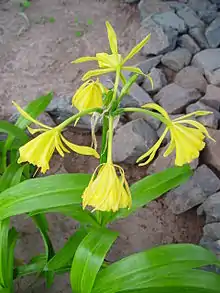Ismene
Translingual
Etymology
From Ancient Greek Ἰσμήνη (Ismḗnē, “sister of Antigone”); see ![]() Ismene on Wikipedia.Wikipedia
Ismene on Wikipedia.Wikipedia
Proper noun
Ismene f
Hyponyms
- (genus of Amaryllidaceae): Ismene amancaes - type species; Ismene hawkesii, Ismene longipetala, Ismene morrisonii, Ismene pedunculata, Ismene ringens, Ismene sublimis, Ismene vargasii - other species
- Ismene × deflexa, Ismene × spofforthiae (nothospecies)
- (genus of Crambidae): Ismene pelusia - sole species
References
- plant
 Ismene (plant) on Wikipedia.Wikipedia
Ismene (plant) on Wikipedia.Wikipedia  Ismene (Amaryllidaceae) on Wikispecies.Wikispecies (includes links to invalid namings and a renamed genus)
Ismene (Amaryllidaceae) on Wikispecies.Wikispecies (includes links to invalid namings and a renamed genus) Ismene on Wikimedia Commons.Wikimedia Commons
Ismene on Wikimedia Commons.Wikimedia Commons
- moth
 Ismene (moth) on Wikipedia.Wikipedia
Ismene (moth) on Wikipedia.Wikipedia  Ismene (Crambinae) on Wikispecies.Wikispecies
Ismene (Crambinae) on Wikispecies.Wikispecies  Ismene (Crambidae) on Wikimedia Commons.Wikimedia Commons
Ismene (Crambidae) on Wikimedia Commons.Wikimedia Commons
English
Etymology
From Ancient Greek Ἰσμήνη (Ismḗnē).
Pronunciation
- IPA(key): /ɪzˈmiːni/
Proper noun
Ismene
- A female given name from Ancient Greek
- (Greek mythology) A daughter and half-sister of Oedipus, daughter and granddaughter of Jocasta, and sister of Antigone, Eteocles and Polynices.
- 2012, André Lardinois, “5: Antigone”, in Kirk Ormand, editor, A Companion to Sophocles, Wiley-Blackwell, page 65:
- Ismene and the Guard are the opposite of Antigone and Creon, yet for a full understanding of the human condition they are equally important.
- (Greek mythology) A daughter of the river-god Asopus by the nymph Metope.
- (Greek mythology) A daughter and half-sister of Oedipus, daughter and granddaughter of Jocasta, and sister of Antigone, Eteocles and Polynices.
- (astronomy) The main belt asteroid 190 Ismene.
Usage notes
- (daughter of Oedipus):
- Appears as a character in several plays by Sophocles, as well as Aeschylus' Seven Against Thebes.
- (daughter of Asopus):
- Named in the Bibliotheca of Pseudo-Apollodorus.
Further reading
 Ismene on Wikipedia.Wikipedia
Ismene on Wikipedia.Wikipedia  Ismene (daughter of Asopus) on Wikipedia.Wikipedia
Ismene (daughter of Asopus) on Wikipedia.Wikipedia  190 Ismene on Wikipedia.Wikipedia
190 Ismene on Wikipedia.Wikipedia
Latin
Etymology
Borrowed from Ancient Greek Ἰσμήνη (Ismḗnē).
Pronunciation
- (Classical) IPA(key): /isˈmeː.neː/, [ɪs̠ˈmeːneː]
- (modern Italianate Ecclesiastical) IPA(key): /isˈme.ne/, [izˈmɛːne]
Proper noun
Ismēnē f sg (genitive Ismēnēs); first declension
Declension
First-declension noun (Greek-type), singular only.
| Case | Singular |
|---|---|
| Nominative | Ismēnē |
| Genitive | Ismēnēs |
| Dative | Ismēnae |
| Accusative | Ismēnēn |
| Ablative | Ismēnē |
| Vocative | Ismēnē |
References
- Ismene in Gaffiot, Félix (1934) Dictionnaire illustré latin-français, Hachette.
This article is issued from Wiktionary. The text is licensed under Creative Commons - Attribution - Sharealike. Additional terms may apply for the media files.
